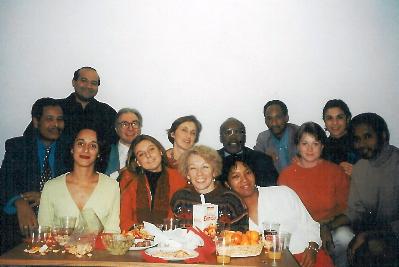Introduction and UNESCO's Mandate
Page 1
Yamousoukro and Seville Statement
Page 2
Origins and Executive Board Adoption
Pages 3 - 4
Launching the Programme: El Salvador and Roundtable
Pages 5 - 6 - 7
1993 General Conference
Page 8
National Projects
Pages 9 - 10
Programme Unit
Page 11
Toward a Global Scope
Pages 12 - 13
Transdisciplinary Project and Human Right to Peace
Pages 14 - 15 - 16
1997: A New Approach
Page 17
UN General Assembly Resolutions
Page 18
Resolution for International Year
Page 19
Declaration and Programme of Action
Pages 20 - 21
Resolution for International Decade
Pages 22 - 23
Training Programmes
Page 24
Global Movement
Pages 25 - 26
Publicity Campaign
Pages 27 - 28
Decentralized Network
Pages 29 - 30
Manifesto 2000
Page 31
Use of Internet
Pages 32 - 33
Future of the Culture of Peace
Pages 34 - 35 - 36 - 37 - 38
By the time of the 29th General Conference of UNESCO in November 1995, the priorities established at the beginning of 1994 had been put into place. National programmes were underway in all regions of the South (Latin America, Africa and Asia). The First International Forum on the Culture of Peace (San Salvador, February 1994) and the First Consultative Meeting on a Culture of Peace (Paris, September 1994) was followed by the Second International Symposium on a Culture of Peace hosted by the Philippines in November 1995. Networking was underway with a wide variety of partners, much of this accomplished through missions to meetings around the world. The Children's festivals had laid a basis for involvement of the Associated Schools Network in the culture of peace. Only fund-raising was unsuccessful: only one of the 23 El Salvador projects was funded (radio for rural women) and none of the Mozambique projects. A comprehensive overview of the Project was provided in the monograph that I had prepared, The Culture of Peace: Towards a Global Movement (October 1995) which the Director-General distributed to delegations who visited him during the General Conference. Some indication of the activities of the Culture of Peace Unit may be found in periodic reports from Leslie Atherley (DIR/CPP) to the Director-General (3 October and 10 December 1994 and 3 July 1995), as well as two newsletters of the Unit published on 2 December 1996 and in April 1997.

Concerned with the failure of fund-raising for national programmes, I undertook a search for partners at a higher level than UNESCO. I took part in a series of international meetings with major donors, for which detailed information was provided to the Director-General in my mission reports.
* 1994 (12-14 July) - Vienna Seminar on Peacekeeping,
* 1994 (30 November - 2 December) - Berlin Seminar on Intercultural Conflict Management
* 1995 (31 March - 4 April) - International Conference on Conflict Mediation and Consolidation of Peace (Bonn),
* 1996 (19 February) - OECD Ad Hoc Working Group on Participatory Development and Good Governance (Paris)
* 1996 (9-12 April) - International Roundtable on Development Cooperation as Preventive Peace Policy (Berlin)
* 1996 (4-5 June) - UNRISD War-Torn Societies Donor Consultation (Geneva)
At the meetings in Bonn and Berlin, I had the very valuable colleagueship of the special advisor for the culture of peace Mohamed Sahnoun. Through these meetings I also came to know Mr Klemens van de Sand at OECD whose 1995 article, The Socio-political System and Development, suggested "allowing NGOs in the South to assume responsibility in part for the planning and imiplementation of development projects." Together, we developed a plan by which our national programmes could enter into the OECD framework. Unfortunately, Mr van de Sand left OECD before this could be seriously tested and we were unable to find a successor who would work with us in the same spirit.
As indicated in my recommendations in various documents throughout this period, I also was looking for a way to institutionalize the training of peace promoters, but without any major success.
 |
 |
 |